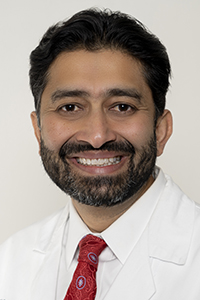Monday, April 10, 2023
The Dawning of a New Age in Stroke Care?
Stroke is a leading cause of death and disability worldwide, with 12.2 million new strokes occurring every year, or one stroke every three seconds. The most common type is known as an ischemic stroke, and it occurs when a blood clot blocks or narrows one of the large arteries leading to the brain. Thanks to a groundbreaking new trial in which WMCHealth participated, there is hope on the horizon for ischemic stroke patients.
 |
| Director of Neurosurgery Chirag Ghandi, MD |
“We now have definitive evidence that endovascular thrombectomy, a procedure involving the catheterization of arteries leading to the brain, is highly effective in improving health outcomes,” says Chirag Gandhi, MD, Director of Neurosurgery at Westchester Medical Center. “The results of the SELECT-2 study were so overwhelmingly positive that the study concluded ahead of schedule. These results will allow us to safely treat a wider population of stroke patients and provide them with better functional recovery and overall higher quality of life.”
Thrombectomy is a minimally invasive procedure that removes a blood clot from a blocked blood vessel using a catheter. The catheter is typically inserted through a small incision in the groin or wrist, where it moves up to the brain and, with the aid of a suction device or a stent, pulls the clot out. Until this study, published in the New England Journal of Medicine, previous evidence only supported the use of thrombectomy in a small subgroup of patients.
“Traditionally, we’ve relied on blood thinners or the ‘clot-busting’ medicine called tissue plasminogen activator (tPA) to break up clots and restore blood flow to the brain,” explained Dr. Gandhi. “Over the last decade we have been performing thrombectomy on a relatively small subgroup of patients up to 24 hours after the stroke based on the data available. "Fortunately, the SELECT-2 trial has shown that a significantly larger number of patients with ischemic strokes can achieve improved functional outcomes when treated within the first 24 hours when compared to those who receive standard medical management.”
The trial, which involved 31 study sites across North America, Australia, New Zealand and Europe, indicated very promising outcomes: Twenty percent of patients who underwent thrombectomy had functional independence by 90 days compared with 7 percent in the patients who only received medical management.
“One of the reasons this study is so exciting is that it definitively shows that even patients with a very large stroke volume, who would typically not be considered for thrombectomy in the past, fared far better than those receiving the traditional medical intervention. It also emphasizes that there is no upper age limit — historically, physicians have been apprehensive about performing thrombectomy on patients in their 80s and 90s,” said Dr. Gandhi. “These results indicate that the most important factor isn’t age, but rather premorbidity, or the patient’s ability to function prior to experiencing the stroke.” The results of SELECT-2 will allow health systems — including WMCHealth hospitals — to open the procedure to 20-30 percent more patients.
Comprehensive Stroke Care
Regardless of which treatment method is used, it’s critical that people experiencing stroke symptoms get to the hospital as soon as possible — preferably a comprehensive stroke center like Westchester Medical Center — because the sooner they seek medical attention, the better their chances are of a positive outcome.
As providers of the most comprehensive stroke care in the Hudson Valley, both Westchester Medical Center and MidHudson Regional Hospital offer thrombectomy for stroke patients. By investing in cutting-edge stroke care technologies and recruiting renowned neurosciences specialists, WMCHealth is committed to serving the community as a leading provider of stroke prevention information, diagnosis and treatment.
For more about WMCHealth’s comprehensive approach to stroke care, reach out to one of our stroke specialists.